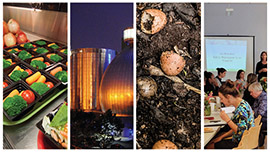Climate Change and Food Systems
More than ever, the world needs global collaboration and local action to keep global warming below a maximum increase of 1.5 degrees Celsius. The Johns Hopkins Center for a Livable Future recognizes the critical role of the food system in this crisis—and asserts that agriculture and dietary change must be part of the transitions needed to reduce greenhouse gas emissions from food. Based on scientific evidence, we advocate for a shift toward low-meat, plant-rich diets and the reduction of food waste, as well as investigation into adaptation and resilience strategies, including the refinement of emergency response plans and improved food security, especially for at-risk populations. Our work in this area includes research, outreach and communication activities.
Outreach and Events
- Trending at COP25: Promising Movement on Food Systems
- 2018 Conference of the Parties to the United Nations Framework Convention on Climate Change (COP 24): CLF Talanoa Dialogue Submission
- COP23 Recognizes – Sort of – Livestock’s Role in Climate Change
- 2018 EAT Stockholm Food Forum: CLF at EAT
- 2018 Global Climate Action Summit (GCAS): Menus and Meals: Climate Action’s Best-Kept Secret for Cities and Businesses
- A View from the COP 21 Sidelines
- Meat, Paris, and Next Steps
- 2015 Conference of the Parties to the United Nations Framework Convention on Climate Change (COP 21): The Importance of Reducing Animal Product Consumption and Wasted Food in Mitigating Catastrophic Climate Change | Blogpost by Raychel Santo | Blogpost by Roni Neff
Peer-Reviewed Publications
- Major Health Gains and Carbon Savings Possible from a Shift to Plant-based Diets
Nature Food, August 13, 2020 - Country-specific dietary shifts to mitigate climate and water crises
Global Environmental Change, September 16, 2019 - Ancillary health effects of climate mitigation scenarios as drivers of policy uptake: a review of air quality, transportation and diet co-benefits modeling studies.
Environmental Research Letters. October 2017. - No Meat, Less Meat, or Better Meat: Understanding NGO Messaging Choices Intended to Alter Meat Consumption in Light of Climate Change. Environmental Communication, December 2014.
- "We don't tell people what to do": An examination of the factors influencing NGO decisions to campaign for reduced meat consumption in light of climate change.
Global Environmental Change, November 2014. - Meat consumption and climate change: the role of non-governmental organizations.
Climatic Change, June 2013. - Yesterday's dinner, tomorrow's weather, today's news? US newspaper coverage of food system contributions to climate change.
Public Health Nutrition, 2008.
White papers and reports
- CLF Policy Recommendations for the Trump Administration and 116th Congress
April 2019 - Governmental Plans to Address Waste of Food
- Climate Solutions: Shifting Diets And Reducing Wasted Food
Talanoa Dialogue Submission. 2018 - CLF Policy Recommendations for the Trump Administration and 115th Congress
January 2017 - The Importance of Reducing Animal Product Consumption and Wasted Food in Mitigating Catastrophic Climate Change
COP 21. December 2015 - Center for a Livable Future Brief: Sustainability Recommendations in the Dietary Guidelines Advisory Committee's Advisory Report
Briefing. April 27, 2015 - What does the 2015 Dietary Guidelines Advisory Committee say about sustainability and a healthy diet?
A fact sheet prepared by the Johns Hopkins Center for a Livable Future, March 2015
Wasted Food
The CLF Wasted Food Project aims to generate evidence that makes a meaningful contribution to the US goal of halving waste of food by 2030.
Learn MoreFood System Resilience
Our Food System Resilience Project aims to use research, policy and education to make sure that food systems are resilient.
Learn MoreThe Connections between Diet, People and Planet
Some ways that everyone can address health, environment and climate change at the table.
Learn More

